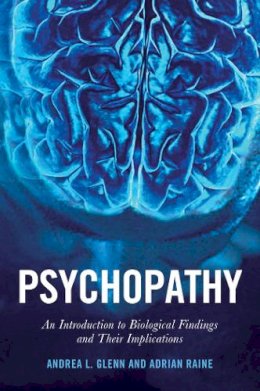
Psychopathy: An Introduction to Biological Findings and Their Implications (Psychology and Crime)
Andrea
A concise overview of the neuropsychology of psychopathy, written in layman's terms
The last two decades have seen tremendous growth in biological research on psychopathy, a mental disorder distinguished by traits including a lack of empathy or emotional response, egocentricity, impulsivity, and stimulation seeking. But how does a psychopath’s brain work? What makes a psychopath?
Psychopathy provides a concise, non-technical overview of the research in the areas of genetics, hormones, brain imaging, neuropsychology, environmental influences, and more, focusing on explaining what we currently know about the biological foundations for this disorder and offering insights into prediction, intervention, and prevention. It also offers a nuanced discussion of the ethical and legal implications associated with biological research on psychopathy. How much of this disorder is biologically based? Should offenders with psychopathic traits be punished for their crimes if we can show that biological factors contribute? The text clearly assesses the conclusions that can and cannot be drawn from existing biological research, and highlights the pressing considerations this research demands.
Product Details
About Andrea
Reviews for Psychopathy: An Introduction to Biological Findings and Their Implications (Psychology and Crime)
Randall Salekin,University of Alabama "Psychopathy: An Introduction to Biological Findings and Their Implicationsis an impressive achievement, covering decades-long research on the neurobiology of antisocial behaviour and psychopathy. Frequently authors cannot see the wood for the trees, but the book clearly maps the growing forest that is our understanding of environmental, neurobiological and genetic contributions to psychopathy."
Times Higher Education
"InPsychopathy,Andrea L. Glenn and Adrian Raine rigorously and cleverly summarize a multitude of findings from studies of behavior, cognition, and brain functioning. . . . [T]he book can be appreciated by students who want to be introduced to one of the domains of cognitive neuroscience that is rather complex and in the process of restructuring itself into not only a legitimate field of study, but also one that is independent from criminology. The book can also be an interesting and useful read for established researchers who want to assess the strengths and weaknesses of a domain before considering it as a field of study. All in all, the text is a good and valuable read which is difficult to put down."
Metapsychology
"Psychopathyis one in a long list of publications designed to provide an overarching summary of a hypothetical neurobiological model of the disorder with the authors goal being to define the disorder in terms of neurobiological deficits, with each of the nine chapters summarizing the presumed influence of a particular factor."
PsycCRITQUES
